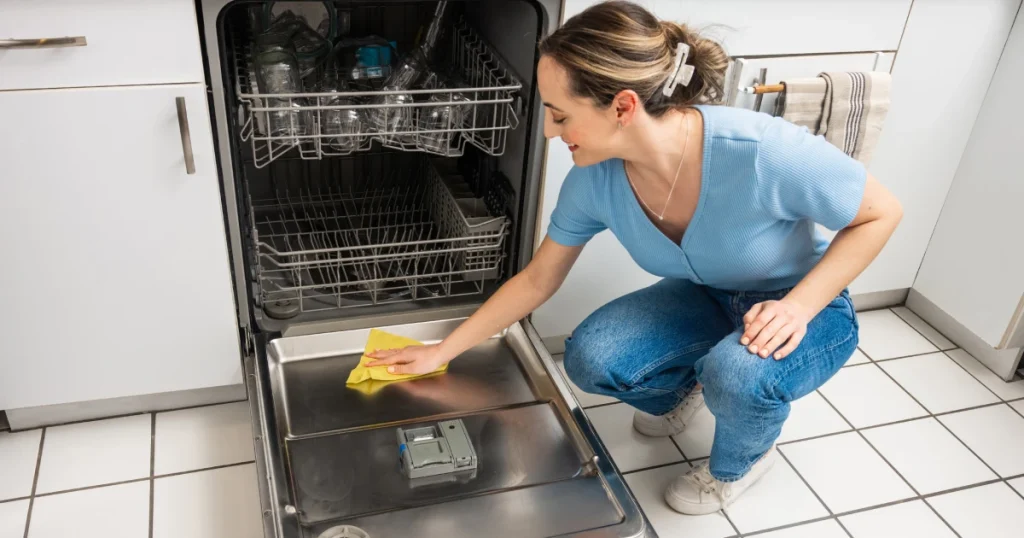Is it possible to wash baby bottles with the dishwasher? This is a question that mothers often ask. Our children are exposed to enough toxic chemicals in their daily lives. The less chemical there is on the dishes, the lower the risk of developing an allergy.
Pediatricians and parents have different opinions. Some believe that it is possible to clean children’s plates in the dishwasher. Others are more certain about the choice. You can, in principle, wash your children’s plates in the dishwasher. However, not all models allow this.
If you don’t have a dishwasher at home yet, it is important to learn about how to select a dishwasher, and the recommended methods for washing dishes. Attention must be paid to the maximum temperature of water when washing.
Nipples can be washed in the dishwasher but feeding bottles should be done by hand only! For washing dishes for children, the program can last less than 30 min. This time is sufficient for the machine’s wash cycle to thoroughly clean and rinse the dishes.
It is best to use detergents that are designed for washing children’s plates. Dishwashers are set to 60-70 degrees C, which is sufficient for disinfection. If you’re still concerned about an infection, boil bottles and nipples once they have been washed.
Can you wash baby bottles in the dishwasher?
It is important to rinse dishes thoroughly with clean water after using any type of detergent. This will ensure that the product does not stay on the dish surface. The detergent must meet certain requirements.
- It is important that the detergent is safe for children. Also, it is important to read the instructions before using!
- It is possible that the composition of detergents contains a component which kills bacteria. This will allow for a more effective cleaning of dishes. Ensure that the detergent is not harmful to your health.
- It shouldn’t contain any aggressive substances.
- Avoid using abrasive cleaning products, which will scratch the surface.
- The product must be soft, and washed in both hot and cold water.
- The flavor can be present in a small amount.
Children’s dishes should be dried with a napkin, not a towel after washing in the dishwasher. Dishwashers are able to wash dishes quickly and efficiently with little foam or smell. This increases the safety of the material, eliminates unpleasant odors and does not leave streaks.
You can wash your own dishes first if you are unsure about a purchase, but still reluctant to wash the dishes of children. You are the only one responsible for your child’s health. You can start by washing your own dishes.
Baby Dishwashing Requirements
The fat content of children’s food is lower than that of adult food, so you can use something less toxic to replace the usual household chemicals. Baby dishes have a number of different requirements:
- Hypoallergenicity
- Minimum components
- No harsh odors
- Rinse with any water temperature
- Antibacterial properties are present.
- Maximum naturalness
There are many resources, such as mustard, lemon juice and the Soap Nuts. The Soap Nuts are 100% dried fruits from the soap tree. It is effective against fresh food contamination. It is also hypoallergenic and has antibacterial properties.
Disadvantages to washing baby bottles in the dishwasher
You are probably very familiar with using a dishwasher if you own one for your family. We must wash the dishes of children with caution.
Here are a few things to consider:
- Mold can grow in difficult-to-clean places, such as the dishwasher and nooks and crannies. Mold is a powerful allergen and can cause atopic skin disease in children.
- Too hot water. Children’s special utensils can be made of plastics or resins. Prolonged exposure to heat will damage these materials and cause them to lose their chemical components.
- Dishwasher detergents are more aggressive than hand-washing detergents. Grease and dirt will dissolve without the use of washcloths.
- The dishwasher does not remove streaks, but dries them. As already stated, the health of a child can be negatively affected by what an adult’s body can endure.
Pediatricians wash bottles by hand. It is obvious that, in light of the above, it is best to wash bottles by hand instead of using the dishwasher.
- Wash as soon as possible. Fresh dirt is easier to remove.
- Do not use the dishwasher. Wash your clothes by hand.
- Rinse the dish thoroughly.
- Use improvised methods. Towels, sponges, brushes, etc. should be used on the dishes of children.
- The storage and replacement of washcloths, brushes, and sponges must be done in a proper manner.
